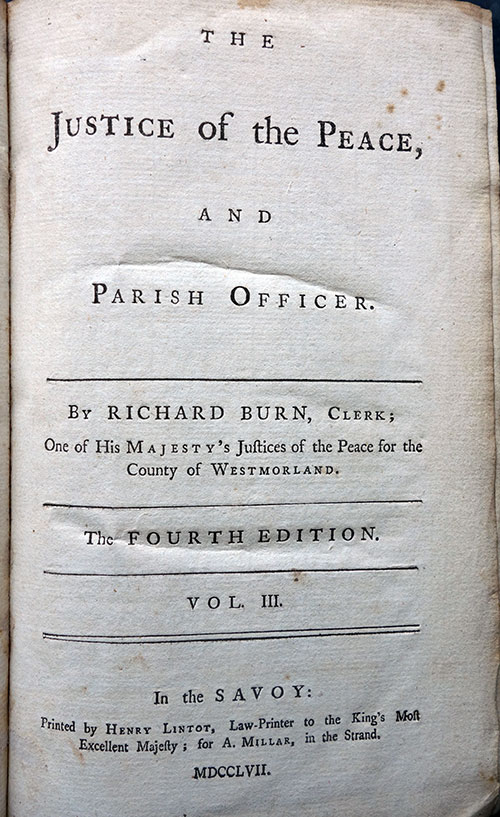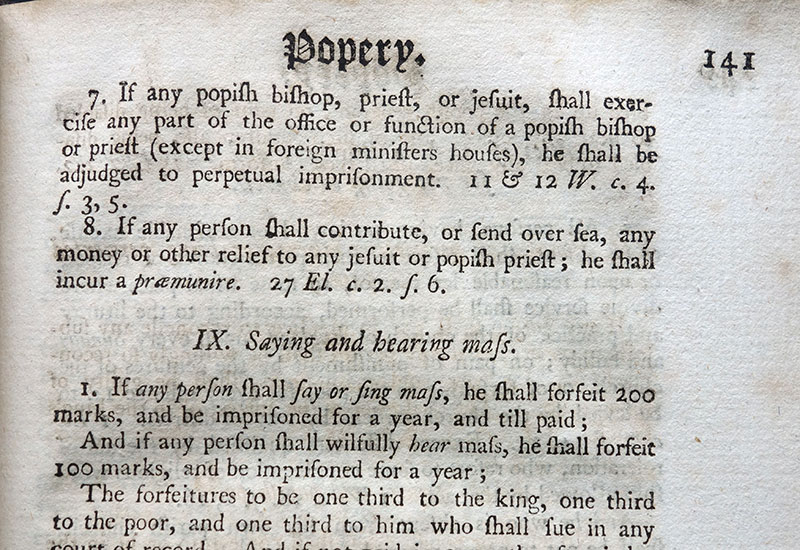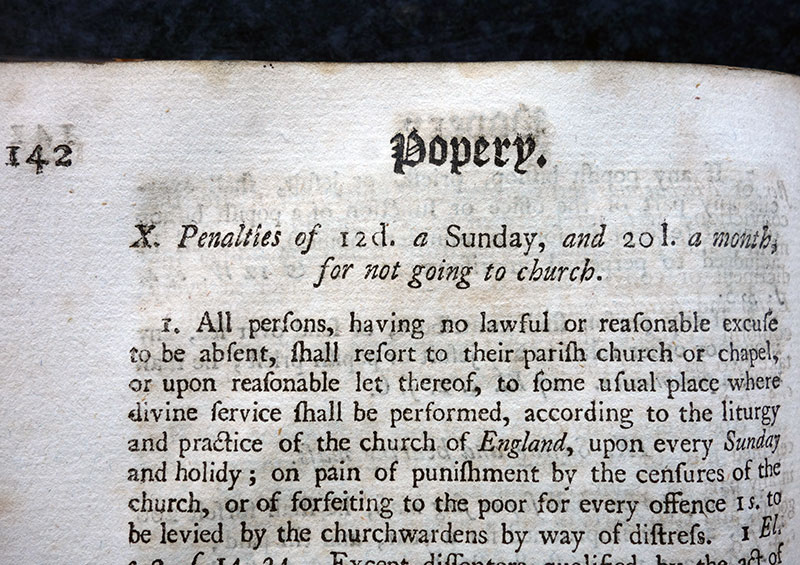My father works in a book charity shop. He came across this old book “The Justice of the Peace” – MDCCLVII (That is 1757 if my Latin is up to scratch). This was a very different period. A time in history pre-French and American Revolutions, a time before any meaningful industrial revolution.
It was interesting to see and feel a book 259 years old – still in quite good condition. There is always a thrill to books, but especially hard-backed books that are quite old.
It is a book about the laws and customs of the time – a guide for justices of the peace who dispensed local justice. I was a little surprised about the content. The first page I opened was a big chapter on “Popery”. In those days, there were strict anti-Catholic laws. To say or hear Catholic Mass could lead to one years imprisonment.
On other pages, there were punishments for people who didn’t attend an approved Sunday Service.
There was also a big chapter on Vagrancy. It was kind of amusing how frequent the expression “Incorrigible Rogues” was. Less amusing was the fact ‘incorrigible rogues’ could face punishments like whipping and imprisonment – to discourage idleness and disorderly conduct.
It is quite a weighty book, and despite all the problems of modern society, you get a glimpse that at least in some regard we have made some progress. Certainly it was a harsh and authoritarian society, where a particularly form of worship (or lack thereof) could lead to imprisonment – and in the Eighteenth Century, imprisonment was no laughing matter.
A few decades after this books publication in 1778, the first of Catholic Emancipation acts was passed. The “Papists Act” allowed Roman Catholics to own property, to inherit land, and to join the army – subject to an oath renouncing Stuart claims to the throne and the civil jurisdiction of the Pope. Even this moderate emancipation was controversial. Reaction against this act led to riots in Scotland in 1779 and then the Gordon Riots in London on June 2, 1780. These ideological clashes over Protestantism vs Catholic are mostly forgotten in Great Britain. Though, of course, former intolerances and ignorance can take new forms.
We look back and are bemused at some of societies attitudes 300 years ago. But, perhaps sometime in the future, other people will look back at our newspapers and be bemused at what used to fill the newspapers in the ‘dark ages’ of the 2000s.
Since the Eighteenth Century we have largely seen improvements in the notion and practise of religious tolerance. A contemporary of the time Thomas Jefferson drafted one of the first bills for religious tolerance in his native Virginia, US.
“That our civil rights have no dependance on our religious opinions, any more than our opinions in physics or geometry; that therefore the proscribing any citizen as unworthy the public confidence by laying upon him an incapacity of being called to offices of trust and emolument, unless he profess or renounce this or that religious opinion, is depriving him injuriously of those privileges and advantages to which, in common with his fellow citizens, he has a natural right; that it tends also to corrupt the principles of that very religion it is meant to encourage, by bribing, with a monopoly of worldly honours and emoluments, those who will externally profess and conform to it; that though indeed these are criminal who do not withstand such temptation, yet neither are those innocent who lay the bait in their way;” (1777 bill on religious tolerance)
However, religious tolerance is only the start because from tolerance we can come to an attitude where we see equal validity in different paths. Rather than seeing competitors, we see followers of other paths as equal brothers. The real change is not just about changing laws, but the change in inner attitudes.
“True religion has a universal quality. It does not find fault with other religions. False religions will find fault with other religions; they will say that theirs is the only valid religion and their prophet is the only saviour. But a true religion will feel that all the prophets are saviours of mankind. Forgiveness, compassion, tolerance, brotherhood and the feeling of oneness are the signs of a true religion.”
– Sri Chinmoy
Age of Trees
Out of interest, I wonder if some of the trees – here, were planted at a similar age to when this book was published. It is quite possible.
Further reading
- Time line of religious tolerance – at Biography Online
- Quotes on religion by Sri Chinmoy



